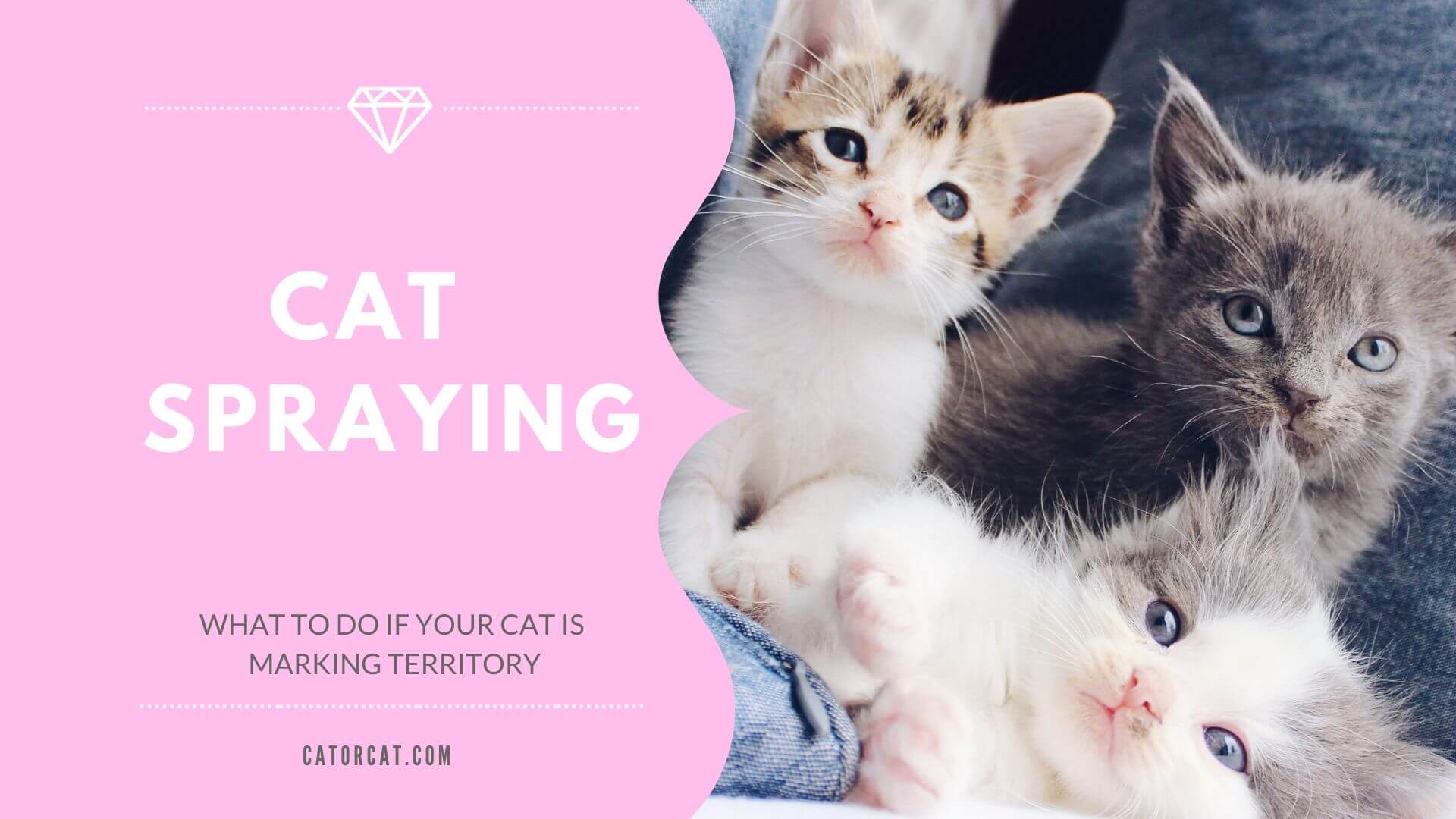
Spraying is one of the most common behavioral problems in cats. You may discover urine dripping from your curtains or on the side of your sofa, or on your doors. While this may be a complete headache for humans, it’s actually normal behavior for cats.In the wild, cats communicate with other cats through scent, and spraying is one of the best ways they send messages to each other. Other means of their communication include rubbing, and scratching but spraying seems to be the most problematic for cat owners.So why do cats do this and how can you stop them? Let’s start our discussion with what is spraying in the first place?
What is Spraying?
Spraying is a normal cat behavior cats use to send messages. Spraying is different than urinating due to the fact that cats only deposit a small amount of urine on a surface. They also display other behaviors when they spray, such as backing up to the area or quivering their tail.
Cats spray because the pungent smell in their urine stays on the spot. It’s a great way for them to signal to other cats to stay away or create an atmosphere of familiarity.
Spraying or marking is completely normal behavior but it can also be a sign of other things, such as your cat feeling threatened in a multi-cat household, or they may be undergoing some stress. As mentioned, cats spray to communicate a message, and this message could mean several different things.
Why Cats Spray?
There are many possible reasons why cats spray. Let’s take a look at these reasons:
1. To Mark a Territory
If another cat is around, cats spray areas or surfaces to mark their territory. If you only have one cat, your cat may spray your window or doors when she sees an outdoor cat lurking around outside the house.If you have a multi-cat household, your cat may spray on a certain area to signal the other cats to stay away.
2. When There is Conflict
When you have a multi-cat household, cats spray to draw boundaries, or settle disputes. They don’t really have a good communication system so spraying is one way that they communicate with other cats. They also tend to be hostile to one another, so in order for them to send messages to other cats, they use urine marking as a means to solve conflicts.
3. When There is Change in the House
Cats are creatures of habit and any change in their environment can give them stress. Cats may spray because they are under some sort of stress from a sudden change in the house. Some of these changes could be you moving into a new home, there’s a new member of the family (even new cat), or even the simple rearranging of furniture can give your cat some amount of stress.
4. Your Cat is Mating
If your cat has not been spayed or neutered, they spray to signal to other cats that they are mating.
5. Medical Problems
And lastly, cats may not be spraying at all but could display a symptom of a medical issue.
Spraying Versus Sign of a Medical Issue
If you’re unsure whether or not your cat is spraying or showing signs of a medical issue, there are certain things to keep in mind about spraying that completely differentiates it from the signs of urinary tract infection or blockage.Here are simple things to know that your cat is spraying and that it’s not a medical issue:
1. Cats Spray on Vertical Surfaces
Cats spray on vertical surfaces such as on window or door frames, the side of sofas, down on curtains, and any surface where their urine flows vertically. It is very rare that they would spray on the floor, ground, or any horizontal surfaces.
2. They Still Use Their Litter Box to Pee or Poo
Your cat may be spraying on your curtains but she still uses her litter box to pee or poo.
Related: How long can cats hold their pee
3. They Exhibit Accompanying Behaviors
After your cat sprays on the area or surface, your cat typically displays other telling behaviors of spraying, such as standing nearby with their back to the object; quivering their tail; or holding their tail straight up when near the area.
How to Solve the Problem
Though spraying is a normal cat behavior, you wouldn’t just let them do it all the time. Your home can smell awful with their pungent urine smell and think about your curtains and furniture.So we’ve listed a few things that can help solve the problem.
1. Health Check
If you think your cat is spraying unusually or they do it all of a sudden when they didn’t do it before and you’re suspicious that they may be suffering from a medical issue, the best thing to do is to bring her to a vet.
A vet can rule out any underlying medical condition so you can do other things that can help solve the problem. Make sure your cat is free of any feline lower urinary tract disease, metabolic disease, and neurological disorders that may play a role in your cat’s spraying or incontinence.
2. Spay or Neuter
If your cat has not been spayed or neutered, it’s about time that you have them done. Spaying or neutering can prevent your cat from spraying when their reproductive organs are removed. As mentioned fore, mating is one of the reasons why cats spray, so spaying your female cats or neutering your male cats can eliminate this cause.
3. Litter Box Management
Cats are one of the cleanest pets around. They hate it when their litter box is soiled and unpleasant. So you may have to frequently clean their litter box, once every two days. You can also make their litter box more attractive and pleasant. They love it when there’s more space for them to lounge around, but most litter boxes in the market are small. You can buy a bigger one for your cat and make sure it’s pretty or you place it in a spot with better lighting or atmosphere.
Some pet owner would use cat diapers to solve this issue.
4. Make Previously Marked Areas Unattractive
There’s a reason why they choose a certain area to mark. You can block your cat’s access to the spot or spray it with cologne or perfume that your cat hates. You can also put blinds or curtains on windows so your cat won’t see other cats outside.
Why is a Neutered Cat Still Spraying?
We mentioned that spaying or neutering can prevent a cat from spraying but some cats still spray even after they’ve been spayed or neutered. Why is this so? Let’s take a look at some of these reasons:
1. You Didn’t Clean Previously Sprayed Spots
So your cat sprayed your curtain. Now that you had her spayed, why is she still marking the very same curtain? Well, you may have not cleaned or washed it. If your cat’s scent is still there, that could signal your kitty to return to the spot and spray again.You must clean the sprayed spots immediately. Use an enzyme-based cleaner designed to neutralize pet odors to completely remove your cat’s signature smell.
2. Limited Resources in a Multi-cat Household
Cats compete with one another and when there are limited resources in your household, they could be marked as a means to message other cats about their territory.To solve the problem, make sure that every cat has his or her very own similar litter box, they have the same amount of food and water and make sure they have a large playing area.Making sure your cats have more resources can also help solve conflicts.
3. Check with Your Vet
If you’ve done both solutions and your spayed or neutered cat is still spraying, then it may be time to bring her to the vet. They could be under some anxiety or stress, or suffering from a medical issue.
The Bottom Line
Spraying is a normal cat behavior but it doesn’t mean you just let them be. Their urines’ pungent smell is intolerable and you wouldn’t want to live in a house that smells of ammonia, do you?While the smell is enough to make you want to solve the problem, there may be other underlying issues that you need to take into account. But whatever reasons that may be, cat parents don’t need to worry about this seemingly unusual behavior because these simple tips can easily solve the problem.

